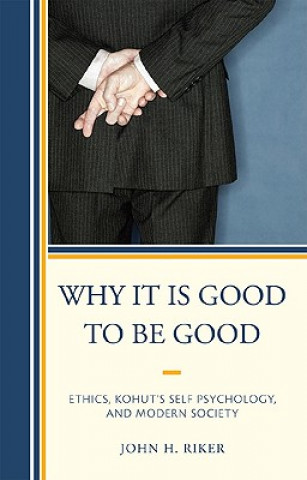
Kod: 04916560
Why It Is Good to Be Good
Autor John H. Riker
In Why It Is Good to be Good, John H. Riker argues that modernity, by undermining traditional religious and metaphysical grounds for moral belief, has left itself no way to explain why it is personally good to be a morally good pe ... więcej
- Język:
 Angielski
Angielski - Oprawa: Twarda
- Liczba stron: 194
Wydawca: Jason Aronson Inc. Publishers, 2010
- Więcej informacji o książce

124.07 €

Dostępna u dostawcy w małych ilościach
Wysyłamy za 10 - 14 dni
Potrzebujesz więcej egzemplarzy?Jeżeli jesteś zainteresowany zakupem większej ilości egzemplarzy, skontaktuj się z nami, aby sprawdzić ich dostępność.
Dodaj do schowka
Zobacz książki o podobnej tematyce
-

Strings and Symmetries 1991
78.39 € -

Probability
176.41 € -

Visual Acuity and the Arts of Communication in Early Modern Germany
196.73 € -

Diabetes Cure
19.92 € -26 % -

Natural Looks for Home (Natural Style)
15.99 € -4 % -

Stand Out 3: Technology Tool Kit
284.69 € -

Women and Reiki
196.73 € -
![Thrice His. 'His to Guard, to Serve, to Save!' a Tale. [By Louisa Jane Campbell Downes.] Thrice His. 'His to Guard, to Serve, to Save!' a Tale. [By Louisa Jane Campbell Downes.]](https://media.libris.to/jacket/08068218t.jpg)
Thrice His. 'His to Guard, to Serve, to Save!' a Tale. [By Louisa Jane Campbell Downes.]
25.45 € -19 % -

Poet's Fate; A Poetical Dialogue.
15.19 € -19 % -

Russo-Japanese War, Lessons Not Learned
56.85 € -1 % -

History of David Grieve
45.38 € -1 % -

Activities Makes Learning Fun
15.89 € -6 % -

Leading Schools of Excellence and Equity
111.60 € -
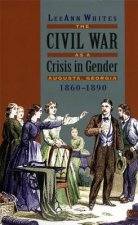
Civil War as a Crisis in Gender
38.43 €
Bon podarunkowy: Radość gwarantowana
- Podaruj bon o dowolnej wartości, a my się zajmiemy resztą.
- Bon podarunkowy dotyczy całej naszej oferty.
- Możesz wydrukować elektroniczny bon z e-maila a następnie przekazać go obdarowanemu.
- Ważność bonu wynosi 12 miesięcy od daty wystawienia.
Więcej informacji o Why It Is Good to Be Good
Za ten zakup dostaniesz 312 punkty
 Opis
Opis
In Why It Is Good to be Good, John H. Riker argues that modernity, by undermining traditional religious and metaphysical grounds for moral belief, has left itself no way to explain why it is personally good to be a morally good person. Furthermore, modernity's regnant concept of the self as an independent agent organized around the optimal satisfaction of desires and involved in an intense economic competition with others intensifies the likelihood that modern persons will see morality as a set of limiting constraints that stand in the way of personal advantage and will tend to cheat when they believe there is little likelihood of getting caught. This cheating has begun to severely undermine modernity's economic and social institutions. Riker proposes that Heinz Kohut's psychoanalytic understanding of the self can provide modernity with a naturalistic ground for saying why it is good to be good. Kohut sees the self as a dynamic, unconscious structure which, when coherent and actively engaged with the world, provides the basis for a heightened sense of lively flourishing. The key to the self's development and sustained coherence is the presence of empathically responsive others-persons Kohut terms selfobjects. Riker argues that the best way to sustain vitalized selfobject relations in adulthood is by becoming an ethical human being. It is persons who develop the Aristotelian moral virtues-empathy for others, a sense of fairness, and a resolute integrity-who are best able to engage in the reciprocal selfobject relations that are necessary to maintain self-cohesion and who are most likely to extend empathic ethical concern to those beyond their selfobject matrixes. Riker also explores how Kohut's concept of the self incorporates a number of the most important insights about the self in the history of philosophy, constructs an original meta-psychology that differentiates the ego from the self, re-envisions ethical life on the basis of a psychoanalytically informed view of human nature, explores how pe
 Szczegóły książki
Szczegóły książki
Kategoria Książki po angielsku Society & social sciences Psychology Psychological theory & schools of thought
124.07 €
- Pełny tytuł: Why It Is Good to Be Good
- Podtytuł: Ethics, Kohut's Self Psychology, and Modern Society
- Autor: John H. Riker
- Język:
 Angielski
Angielski - Oprawa: Twarda
- Liczba stron: 194
- EAN: 9780765707901
- ISBN: 076570790X
- ID: 04916560
- Wydawca: Jason Aronson Inc. Publishers
- Waga: 467 g
- Wymiary: 240 × 163 × 19 mm
- Data wydania: 20. August 2010
Ulubione w innej kategorii
-

Memories, Dreams, Reflections
13.37 € -10 % -

A General Introduction to Psychoanalysis
5.52 € -25 % -
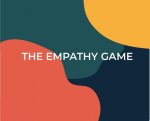
The Empathy Game
15.39 € -14 % -
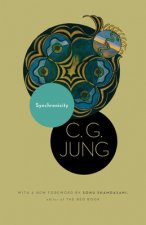
Synchronicity – An Acausal Connecting Principle
14.28 € -
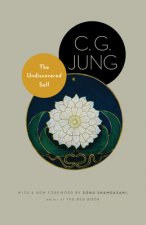
The Undiscovered Self
9.05 € -25 % -

Make It Stick
34.41 € -

The Sublime Object of Ideology
18.31 € -6 % -
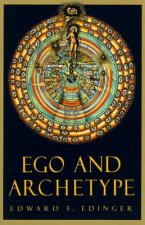
Ego and Archetype
23.14 € -14 % -
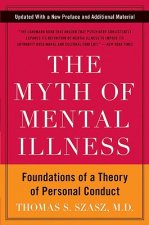
The Myth of Mental Illness
13.27 € -28 % -

Integral Psychology
19.92 € -26 % -
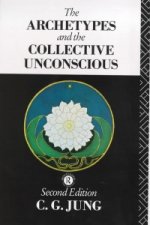
Archetypes and the Collective Unconscious
56.85 € -

Handbook of Attachment
83.92 € -
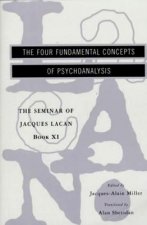
Seminar of Jacques Lacan
19.51 € -21 % -

Skin-Ego
54.74 € -
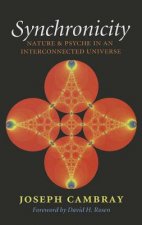
Synchronicity: Nature and Psyche in an Interconnected Universe
15.89 € -24 % -

Behave
12.37 € -16 % -
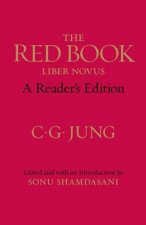
The Red Book – A Reader`s Edition
38.63 € -15 % -

Emotional Intelligence
11.46 € -

Red Book
240.91 € -16 % -

Home is Where We Start from
13.27 € -28 % -

Inner Gold
20.42 € -2 % -

T A Today
20.32 € -9 % -

Masculine and Feminine
22.83 € -25 % -
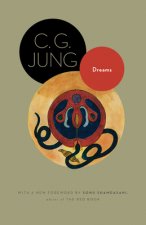
Dreams
14.08 € -25 % -

Civilization and Its Discontents
10.96 € -15 % -

Answer to Job
8.64 € -28 % -

Ego and the Id
3.81 € -18 % -

Jung's Studies in Astrology
49.10 € -5 % -

Two Essays on Analytical Psychology
14.78 € -

Ego, Hunger and Aggression
38.84 € -

Red Book of C.G. Jung
41.96 € -

Touched With Fire
12.27 € -28 % -

Beyond the Pleasure Principle
4.32 € -18 % -
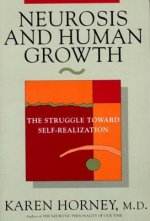
Neurosis and Human Growth
23.24 € -11 % -

Behavioural Economics: A Very Short Introduction
8.95 € -27 % -

Portable Jung
23.54 € -30 % -
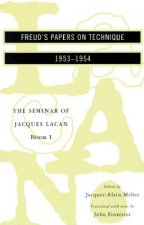
Seminar of Jacques Lacan
21.83 € -15 % -
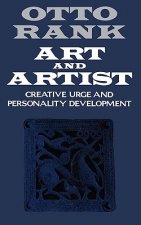
Art and Artist
28.27 € -14 % -

Lucifer Principle
17 € -19 % -

Ego and the Id - First Edition Text
7.03 € -

Practice and Theory of Individual Psychology
15.39 € -

PSYCHOPATHOLOGY & POLITICS
19.01 € -

Lament of the Dead
28.57 € -19 % -

Eternal Drama
21.73 € -15 % -
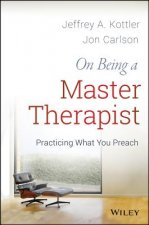
On Being a Master Therapist - Practicing What You Preach
27.87 € -26 % -

Nature in Mind
36.32 € -

Kant's Dove
22.43 € -1 % -

Writing and Madness
27.06 € -11 % -

No Boundary
13.37 € -26 %
Osobní odběr Bratislava a 2642 dalších
Copyright ©2008-24 najlacnejsie-knihy.sk Wszelkie prawa zastrzeżonePrywatnieCookies


 Vrácení do měsíce
Vrácení do měsíce Zdarma od 49.99 €
Zdarma od 49.99 € 02/210 210 99 (8-15.30h)
02/210 210 99 (8-15.30h)